Entrepreneurship and Small Business Management Assignment Report
VerifiedAdded on 2020/06/03
|13
|4216
|107
Report
AI Summary
This report on Entrepreneurship and Small Business Management delves into the core concepts of starting and managing small businesses. It begins by examining different types of entrepreneurial ventures, including small business ventures, large ventures, scalable ventures, and social entrepreneurial ventures, along with their respective typologies such as researcher, determined, and imitating entrepreneurs. The report then compares and contrasts these diverse ventures, highlighting their similarities and differences in terms of lifestyle, business focus, and market strategies. A key aspect of the report is an analysis of how small business organizations impact the economy, emphasizing their role in job creation, innovation, and their ability to adapt to market changes. The significance of small businesses is further explored, emphasizing their role in driving innovation, their adaptability, and their importance to local communities. The report concludes by discussing the characteristic traits of entrepreneurs and how their personalities and backgrounds influence their mindset and entrepreneurial journey. It also touches upon how background and experience may sometimes hinder entrepreneurial pursuits.

ENTREPRENEURSHIP
AND SMALL BUSINESS
MANAGEMENT
AND SMALL BUSINESS
MANAGEMENT
Paraphrase This Document
Need a fresh take? Get an instant paraphrase of this document with our AI Paraphraser
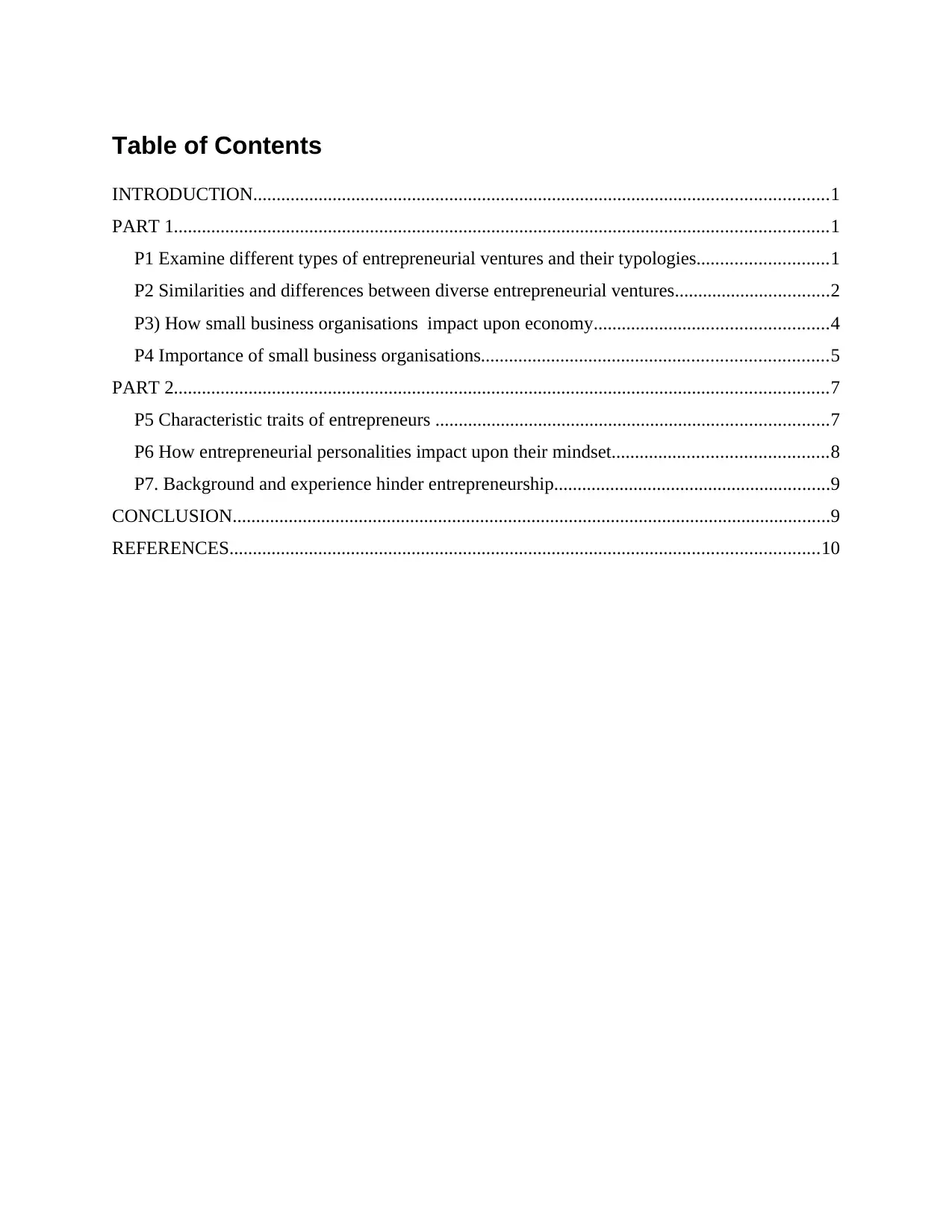
Table of Contents
INTRODUCTION...........................................................................................................................1
PART 1............................................................................................................................................1
P1 Examine different types of entrepreneurial ventures and their typologies............................1
P2 Similarities and differences between diverse entrepreneurial ventures.................................2
P3) How small business organisations impact upon economy..................................................4
P4 Importance of small business organisations..........................................................................5
PART 2............................................................................................................................................7
P5 Characteristic traits of entrepreneurs ....................................................................................7
P6 How entrepreneurial personalities impact upon their mindset..............................................8
P7. Background and experience hinder entrepreneurship...........................................................9
CONCLUSION................................................................................................................................9
REFERENCES..............................................................................................................................10
INTRODUCTION...........................................................................................................................1
PART 1............................................................................................................................................1
P1 Examine different types of entrepreneurial ventures and their typologies............................1
P2 Similarities and differences between diverse entrepreneurial ventures.................................2
P3) How small business organisations impact upon economy..................................................4
P4 Importance of small business organisations..........................................................................5
PART 2............................................................................................................................................7
P5 Characteristic traits of entrepreneurs ....................................................................................7
P6 How entrepreneurial personalities impact upon their mindset..............................................8
P7. Background and experience hinder entrepreneurship...........................................................9
CONCLUSION................................................................................................................................9
REFERENCES..............................................................................................................................10
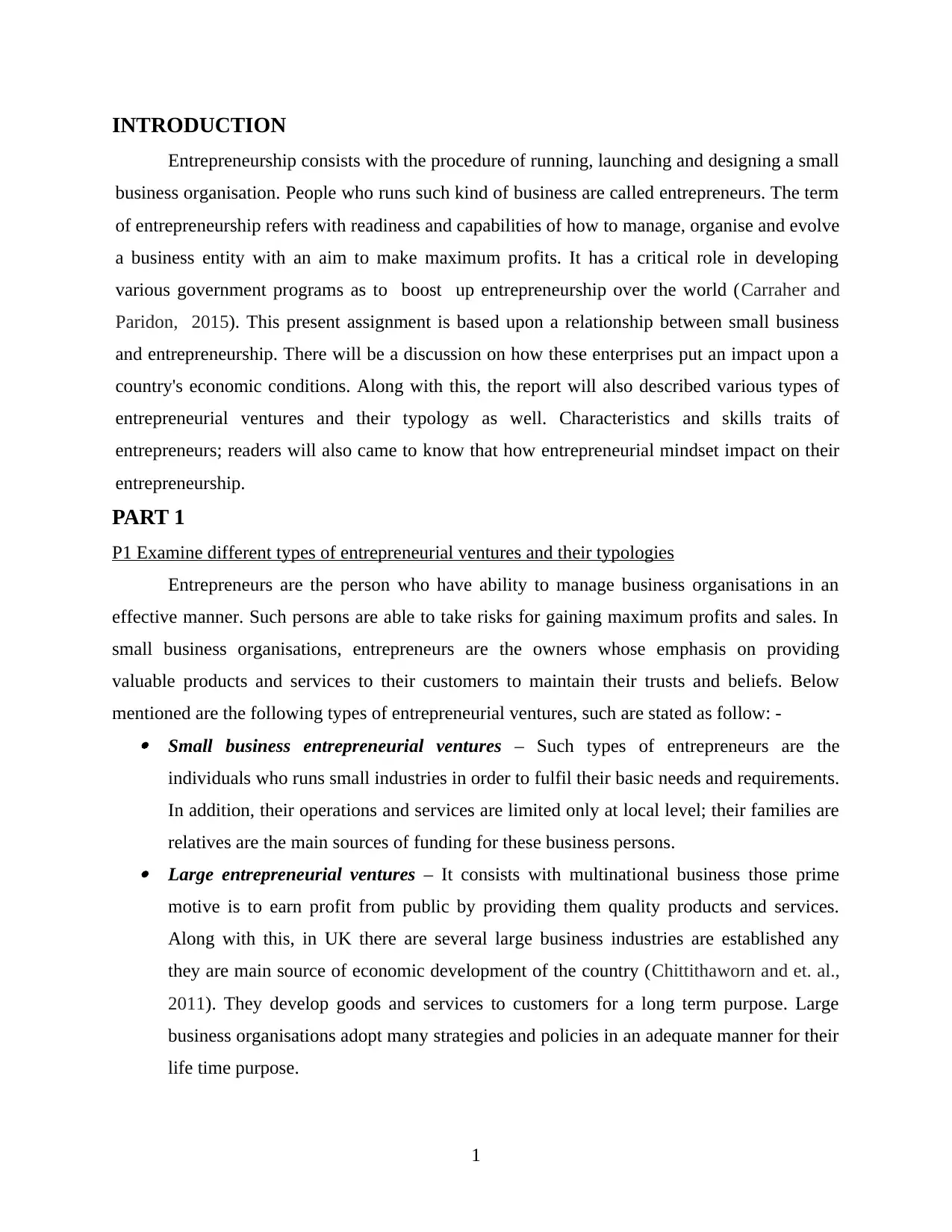
INTRODUCTION
Entrepreneurship consists with the procedure of running, launching and designing a small
business organisation. People who runs such kind of business are called entrepreneurs. The term
of entrepreneurship refers with readiness and capabilities of how to manage, organise and evolve
a business entity with an aim to make maximum profits. It has a critical role in developing
various government programs as to boost up entrepreneurship over the world (Carraher and
Paridon, 2015). This present assignment is based upon a relationship between small business
and entrepreneurship. There will be a discussion on how these enterprises put an impact upon a
country's economic conditions. Along with this, the report will also described various types of
entrepreneurial ventures and their typology as well. Characteristics and skills traits of
entrepreneurs; readers will also came to know that how entrepreneurial mindset impact on their
entrepreneurship.
PART 1
P1 Examine different types of entrepreneurial ventures and their typologies
Entrepreneurs are the person who have ability to manage business organisations in an
effective manner. Such persons are able to take risks for gaining maximum profits and sales. In
small business organisations, entrepreneurs are the owners whose emphasis on providing
valuable products and services to their customers to maintain their trusts and beliefs. Below
mentioned are the following types of entrepreneurial ventures, such are stated as follow: - Small business entrepreneurial ventures – Such types of entrepreneurs are the
individuals who runs small industries in order to fulfil their basic needs and requirements.
In addition, their operations and services are limited only at local level; their families are
relatives are the main sources of funding for these business persons. Large entrepreneurial ventures – It consists with multinational business those prime
motive is to earn profit from public by providing them quality products and services.
Along with this, in UK there are several large business industries are established any
they are main source of economic development of the country (Chittithaworn and et. al.,
2011). They develop goods and services to customers for a long term purpose. Large
business organisations adopt many strategies and policies in an adequate manner for their
life time purpose.
1
Entrepreneurship consists with the procedure of running, launching and designing a small
business organisation. People who runs such kind of business are called entrepreneurs. The term
of entrepreneurship refers with readiness and capabilities of how to manage, organise and evolve
a business entity with an aim to make maximum profits. It has a critical role in developing
various government programs as to boost up entrepreneurship over the world (Carraher and
Paridon, 2015). This present assignment is based upon a relationship between small business
and entrepreneurship. There will be a discussion on how these enterprises put an impact upon a
country's economic conditions. Along with this, the report will also described various types of
entrepreneurial ventures and their typology as well. Characteristics and skills traits of
entrepreneurs; readers will also came to know that how entrepreneurial mindset impact on their
entrepreneurship.
PART 1
P1 Examine different types of entrepreneurial ventures and their typologies
Entrepreneurs are the person who have ability to manage business organisations in an
effective manner. Such persons are able to take risks for gaining maximum profits and sales. In
small business organisations, entrepreneurs are the owners whose emphasis on providing
valuable products and services to their customers to maintain their trusts and beliefs. Below
mentioned are the following types of entrepreneurial ventures, such are stated as follow: - Small business entrepreneurial ventures – Such types of entrepreneurs are the
individuals who runs small industries in order to fulfil their basic needs and requirements.
In addition, their operations and services are limited only at local level; their families are
relatives are the main sources of funding for these business persons. Large entrepreneurial ventures – It consists with multinational business those prime
motive is to earn profit from public by providing them quality products and services.
Along with this, in UK there are several large business industries are established any
they are main source of economic development of the country (Chittithaworn and et. al.,
2011). They develop goods and services to customers for a long term purpose. Large
business organisations adopt many strategies and policies in an adequate manner for their
life time purpose.
1
⊘ This is a preview!⊘
Do you want full access?
Subscribe today to unlock all pages.

Trusted by 1+ million students worldwide
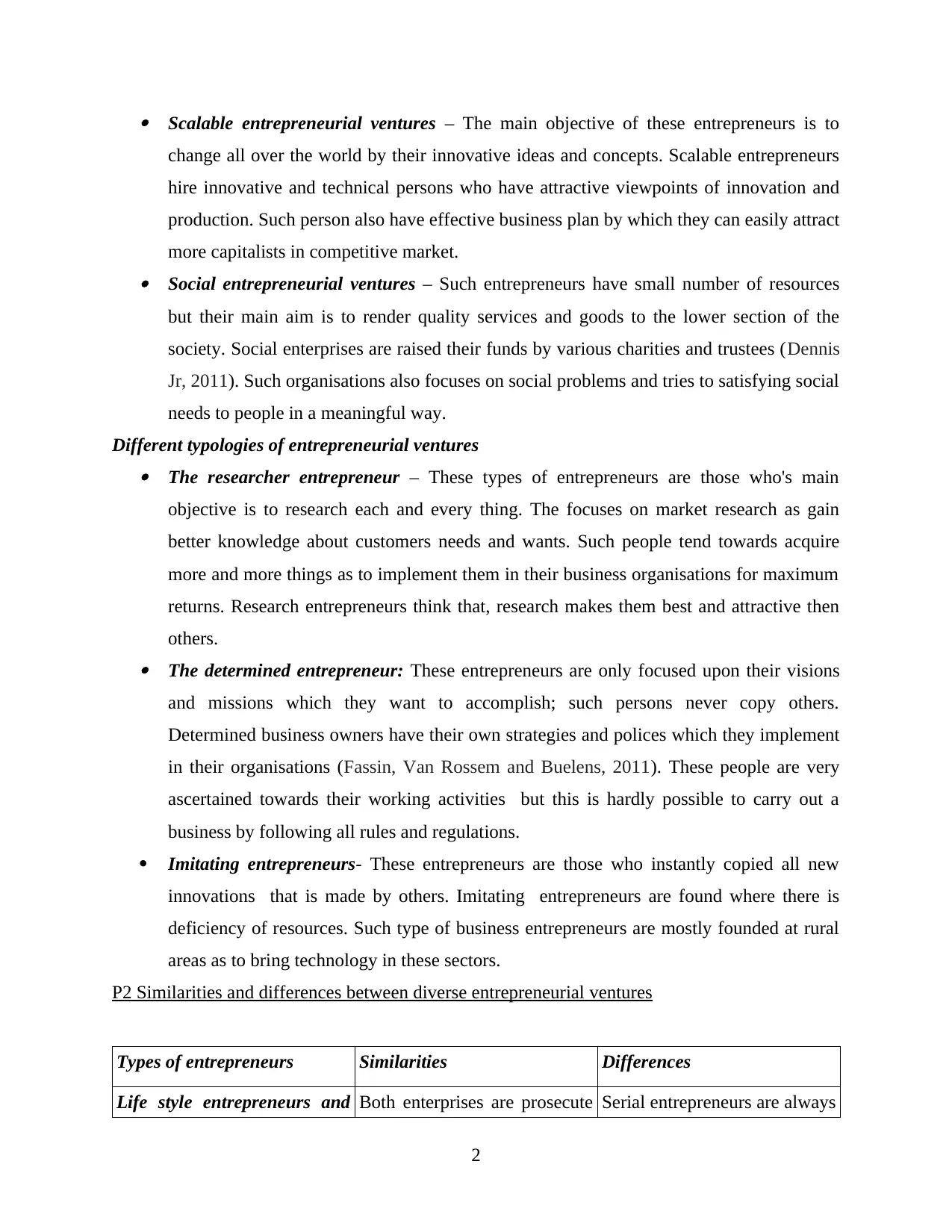
Scalable entrepreneurial ventures – The main objective of these entrepreneurs is to
change all over the world by their innovative ideas and concepts. Scalable entrepreneurs
hire innovative and technical persons who have attractive viewpoints of innovation and
production. Such person also have effective business plan by which they can easily attract
more capitalists in competitive market. Social entrepreneurial ventures – Such entrepreneurs have small number of resources
but their main aim is to render quality services and goods to the lower section of the
society. Social enterprises are raised their funds by various charities and trustees (Dennis
Jr, 2011). Such organisations also focuses on social problems and tries to satisfying social
needs to people in a meaningful way.
Different typologies of entrepreneurial ventures The researcher entrepreneur – These types of entrepreneurs are those who's main
objective is to research each and every thing. The focuses on market research as gain
better knowledge about customers needs and wants. Such people tend towards acquire
more and more things as to implement them in their business organisations for maximum
returns. Research entrepreneurs think that, research makes them best and attractive then
others. The determined entrepreneur: These entrepreneurs are only focused upon their visions
and missions which they want to accomplish; such persons never copy others.
Determined business owners have their own strategies and polices which they implement
in their organisations (Fassin, Van Rossem and Buelens, 2011). These people are very
ascertained towards their working activities but this is hardly possible to carry out a
business by following all rules and regulations.
Imitating entrepreneurs- These entrepreneurs are those who instantly copied all new
innovations that is made by others. Imitating entrepreneurs are found where there is
deficiency of resources. Such type of business entrepreneurs are mostly founded at rural
areas as to bring technology in these sectors.
P2 Similarities and differences between diverse entrepreneurial ventures
Types of entrepreneurs Similarities Differences
Life style entrepreneurs and Both enterprises are prosecute Serial entrepreneurs are always
2
change all over the world by their innovative ideas and concepts. Scalable entrepreneurs
hire innovative and technical persons who have attractive viewpoints of innovation and
production. Such person also have effective business plan by which they can easily attract
more capitalists in competitive market. Social entrepreneurial ventures – Such entrepreneurs have small number of resources
but their main aim is to render quality services and goods to the lower section of the
society. Social enterprises are raised their funds by various charities and trustees (Dennis
Jr, 2011). Such organisations also focuses on social problems and tries to satisfying social
needs to people in a meaningful way.
Different typologies of entrepreneurial ventures The researcher entrepreneur – These types of entrepreneurs are those who's main
objective is to research each and every thing. The focuses on market research as gain
better knowledge about customers needs and wants. Such people tend towards acquire
more and more things as to implement them in their business organisations for maximum
returns. Research entrepreneurs think that, research makes them best and attractive then
others. The determined entrepreneur: These entrepreneurs are only focused upon their visions
and missions which they want to accomplish; such persons never copy others.
Determined business owners have their own strategies and polices which they implement
in their organisations (Fassin, Van Rossem and Buelens, 2011). These people are very
ascertained towards their working activities but this is hardly possible to carry out a
business by following all rules and regulations.
Imitating entrepreneurs- These entrepreneurs are those who instantly copied all new
innovations that is made by others. Imitating entrepreneurs are found where there is
deficiency of resources. Such type of business entrepreneurs are mostly founded at rural
areas as to bring technology in these sectors.
P2 Similarities and differences between diverse entrepreneurial ventures
Types of entrepreneurs Similarities Differences
Life style entrepreneurs and Both enterprises are prosecute Serial entrepreneurs are always
2
Paraphrase This Document
Need a fresh take? Get an instant paraphrase of this document with our AI Paraphraser
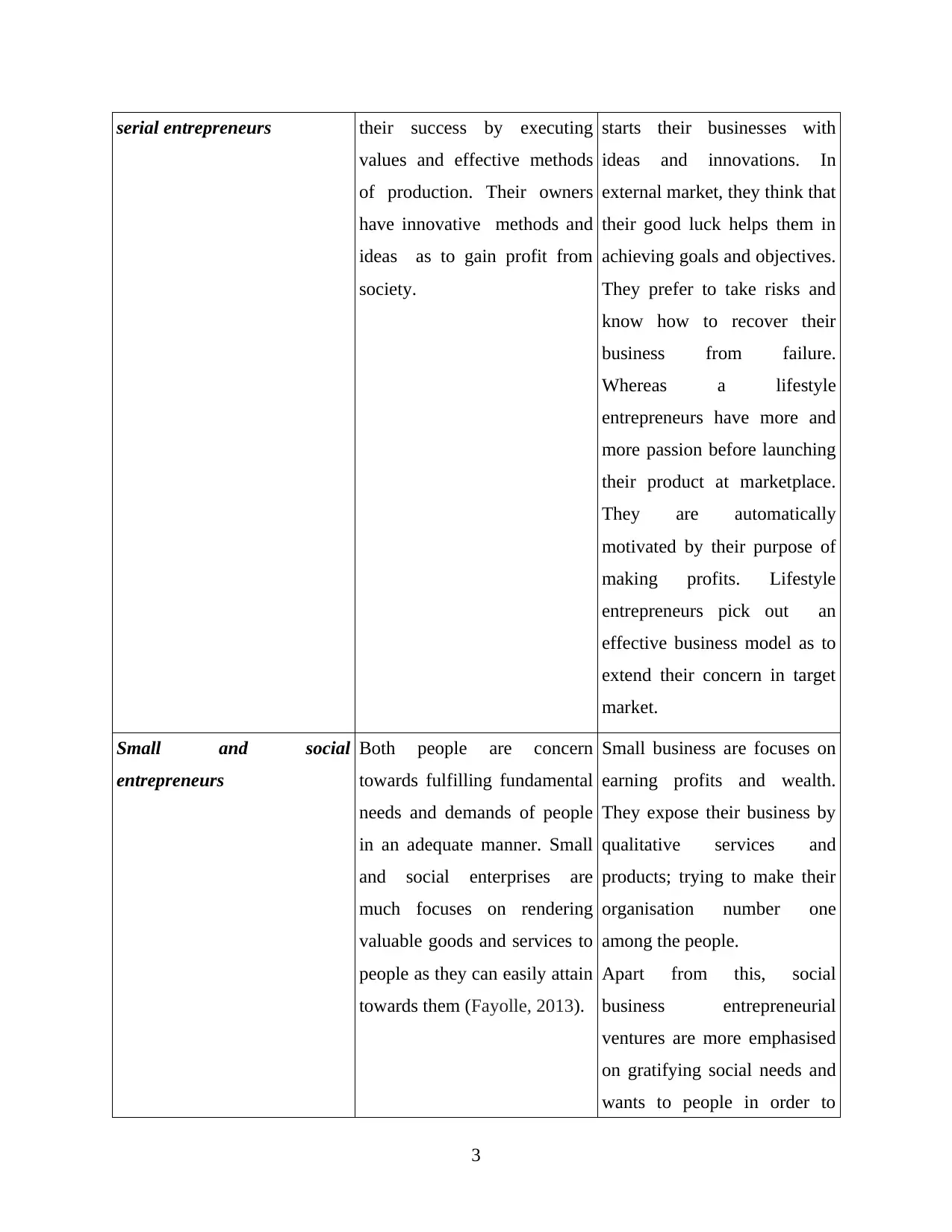
serial entrepreneurs their success by executing
values and effective methods
of production. Their owners
have innovative methods and
ideas as to gain profit from
society.
starts their businesses with
ideas and innovations. In
external market, they think that
their good luck helps them in
achieving goals and objectives.
They prefer to take risks and
know how to recover their
business from failure.
Whereas a lifestyle
entrepreneurs have more and
more passion before launching
their product at marketplace.
They are automatically
motivated by their purpose of
making profits. Lifestyle
entrepreneurs pick out an
effective business model as to
extend their concern in target
market.
Small and social
entrepreneurs
Both people are concern
towards fulfilling fundamental
needs and demands of people
in an adequate manner. Small
and social enterprises are
much focuses on rendering
valuable goods and services to
people as they can easily attain
towards them (Fayolle, 2013).
Small business are focuses on
earning profits and wealth.
They expose their business by
qualitative services and
products; trying to make their
organisation number one
among the people.
Apart from this, social
business entrepreneurial
ventures are more emphasised
on gratifying social needs and
wants to people in order to
3
values and effective methods
of production. Their owners
have innovative methods and
ideas as to gain profit from
society.
starts their businesses with
ideas and innovations. In
external market, they think that
their good luck helps them in
achieving goals and objectives.
They prefer to take risks and
know how to recover their
business from failure.
Whereas a lifestyle
entrepreneurs have more and
more passion before launching
their product at marketplace.
They are automatically
motivated by their purpose of
making profits. Lifestyle
entrepreneurs pick out an
effective business model as to
extend their concern in target
market.
Small and social
entrepreneurs
Both people are concern
towards fulfilling fundamental
needs and demands of people
in an adequate manner. Small
and social enterprises are
much focuses on rendering
valuable goods and services to
people as they can easily attain
towards them (Fayolle, 2013).
Small business are focuses on
earning profits and wealth.
They expose their business by
qualitative services and
products; trying to make their
organisation number one
among the people.
Apart from this, social
business entrepreneurial
ventures are more emphasised
on gratifying social needs and
wants to people in order to
3
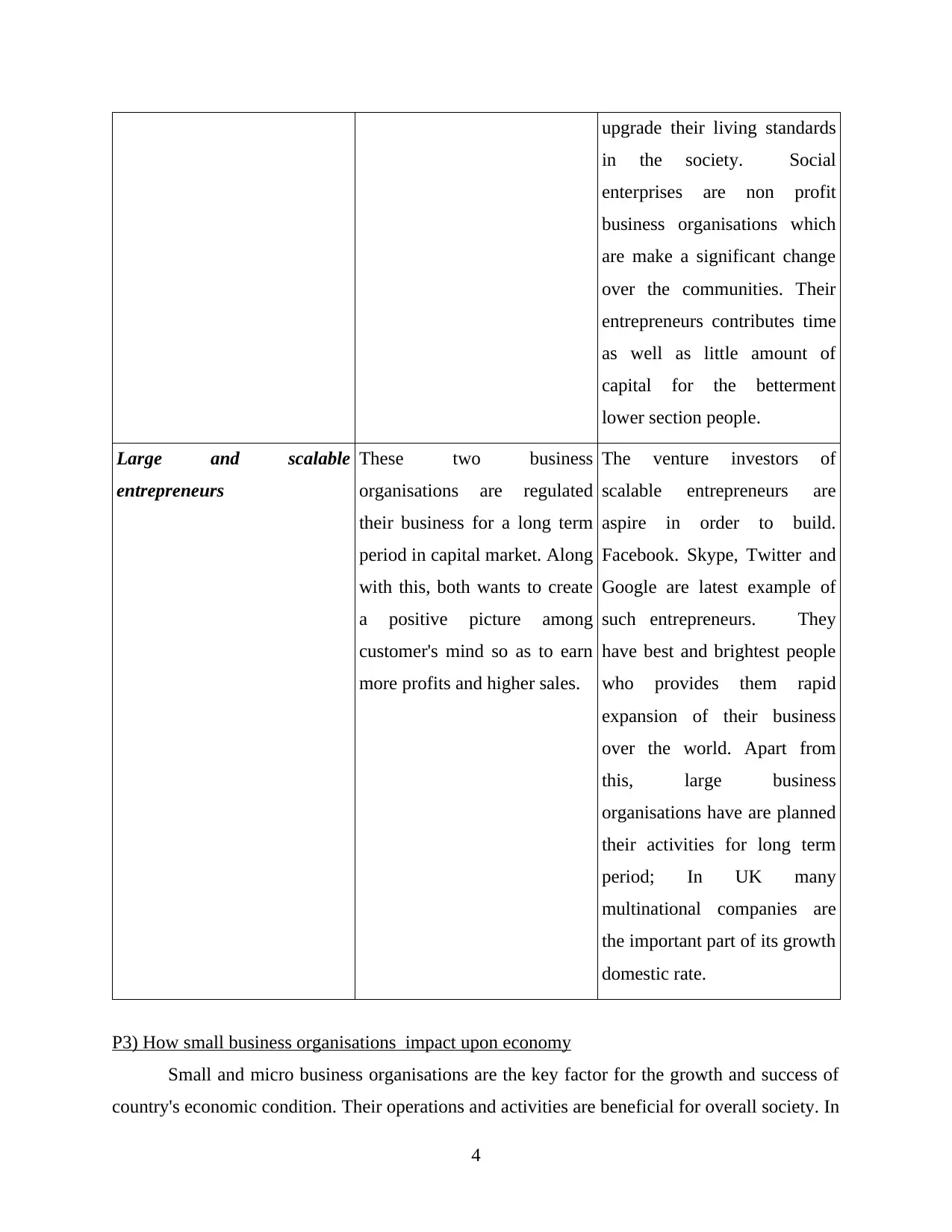
upgrade their living standards
in the society. Social
enterprises are non profit
business organisations which
are make a significant change
over the communities. Their
entrepreneurs contributes time
as well as little amount of
capital for the betterment
lower section people.
Large and scalable
entrepreneurs
These two business
organisations are regulated
their business for a long term
period in capital market. Along
with this, both wants to create
a positive picture among
customer's mind so as to earn
more profits and higher sales.
The venture investors of
scalable entrepreneurs are
aspire in order to build.
Facebook. Skype, Twitter and
Google are latest example of
such entrepreneurs. They
have best and brightest people
who provides them rapid
expansion of their business
over the world. Apart from
this, large business
organisations have are planned
their activities for long term
period; In UK many
multinational companies are
the important part of its growth
domestic rate.
P3) How small business organisations impact upon economy
Small and micro business organisations are the key factor for the growth and success of
country's economic condition. Their operations and activities are beneficial for overall society. In
4
in the society. Social
enterprises are non profit
business organisations which
are make a significant change
over the communities. Their
entrepreneurs contributes time
as well as little amount of
capital for the betterment
lower section people.
Large and scalable
entrepreneurs
These two business
organisations are regulated
their business for a long term
period in capital market. Along
with this, both wants to create
a positive picture among
customer's mind so as to earn
more profits and higher sales.
The venture investors of
scalable entrepreneurs are
aspire in order to build.
Facebook. Skype, Twitter and
Google are latest example of
such entrepreneurs. They
have best and brightest people
who provides them rapid
expansion of their business
over the world. Apart from
this, large business
organisations have are planned
their activities for long term
period; In UK many
multinational companies are
the important part of its growth
domestic rate.
P3) How small business organisations impact upon economy
Small and micro business organisations are the key factor for the growth and success of
country's economic condition. Their operations and activities are beneficial for overall society. In
4
⊘ This is a preview!⊘
Do you want full access?
Subscribe today to unlock all pages.

Trusted by 1+ million students worldwide
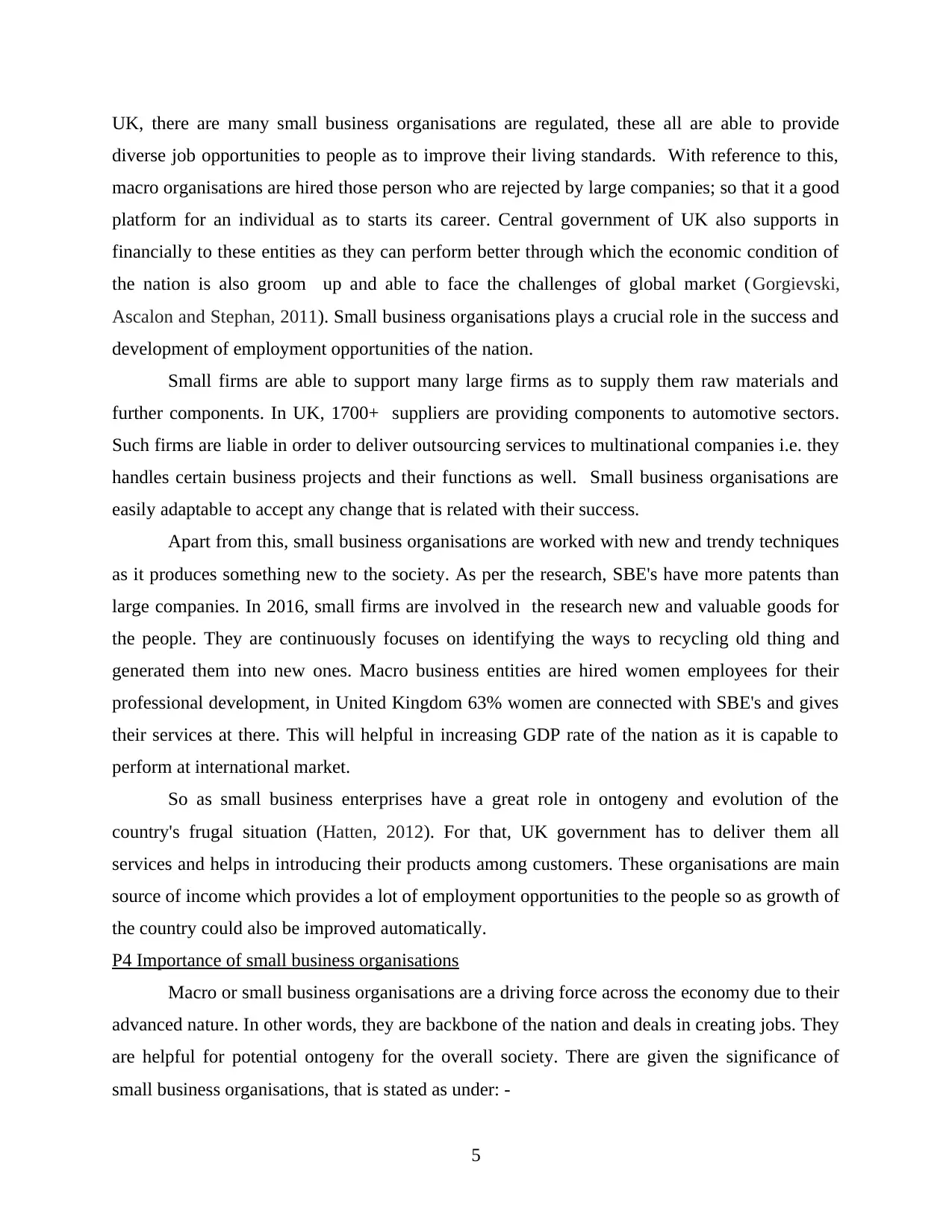
UK, there are many small business organisations are regulated, these all are able to provide
diverse job opportunities to people as to improve their living standards. With reference to this,
macro organisations are hired those person who are rejected by large companies; so that it a good
platform for an individual as to starts its career. Central government of UK also supports in
financially to these entities as they can perform better through which the economic condition of
the nation is also groom up and able to face the challenges of global market ( Gorgievski,
Ascalon and Stephan, 2011). Small business organisations plays a crucial role in the success and
development of employment opportunities of the nation.
Small firms are able to support many large firms as to supply them raw materials and
further components. In UK, 1700+ suppliers are providing components to automotive sectors.
Such firms are liable in order to deliver outsourcing services to multinational companies i.e. they
handles certain business projects and their functions as well. Small business organisations are
easily adaptable to accept any change that is related with their success.
Apart from this, small business organisations are worked with new and trendy techniques
as it produces something new to the society. As per the research, SBE's have more patents than
large companies. In 2016, small firms are involved in the research new and valuable goods for
the people. They are continuously focuses on identifying the ways to recycling old thing and
generated them into new ones. Macro business entities are hired women employees for their
professional development, in United Kingdom 63% women are connected with SBE's and gives
their services at there. This will helpful in increasing GDP rate of the nation as it is capable to
perform at international market.
So as small business enterprises have a great role in ontogeny and evolution of the
country's frugal situation (Hatten, 2012). For that, UK government has to deliver them all
services and helps in introducing their products among customers. These organisations are main
source of income which provides a lot of employment opportunities to the people so as growth of
the country could also be improved automatically.
P4 Importance of small business organisations
Macro or small business organisations are a driving force across the economy due to their
advanced nature. In other words, they are backbone of the nation and deals in creating jobs. They
are helpful for potential ontogeny for the overall society. There are given the significance of
small business organisations, that is stated as under: -
5
diverse job opportunities to people as to improve their living standards. With reference to this,
macro organisations are hired those person who are rejected by large companies; so that it a good
platform for an individual as to starts its career. Central government of UK also supports in
financially to these entities as they can perform better through which the economic condition of
the nation is also groom up and able to face the challenges of global market ( Gorgievski,
Ascalon and Stephan, 2011). Small business organisations plays a crucial role in the success and
development of employment opportunities of the nation.
Small firms are able to support many large firms as to supply them raw materials and
further components. In UK, 1700+ suppliers are providing components to automotive sectors.
Such firms are liable in order to deliver outsourcing services to multinational companies i.e. they
handles certain business projects and their functions as well. Small business organisations are
easily adaptable to accept any change that is related with their success.
Apart from this, small business organisations are worked with new and trendy techniques
as it produces something new to the society. As per the research, SBE's have more patents than
large companies. In 2016, small firms are involved in the research new and valuable goods for
the people. They are continuously focuses on identifying the ways to recycling old thing and
generated them into new ones. Macro business entities are hired women employees for their
professional development, in United Kingdom 63% women are connected with SBE's and gives
their services at there. This will helpful in increasing GDP rate of the nation as it is capable to
perform at international market.
So as small business enterprises have a great role in ontogeny and evolution of the
country's frugal situation (Hatten, 2012). For that, UK government has to deliver them all
services and helps in introducing their products among customers. These organisations are main
source of income which provides a lot of employment opportunities to the people so as growth of
the country could also be improved automatically.
P4 Importance of small business organisations
Macro or small business organisations are a driving force across the economy due to their
advanced nature. In other words, they are backbone of the nation and deals in creating jobs. They
are helpful for potential ontogeny for the overall society. There are given the significance of
small business organisations, that is stated as under: -
5
Paraphrase This Document
Need a fresh take? Get an instant paraphrase of this document with our AI Paraphraser
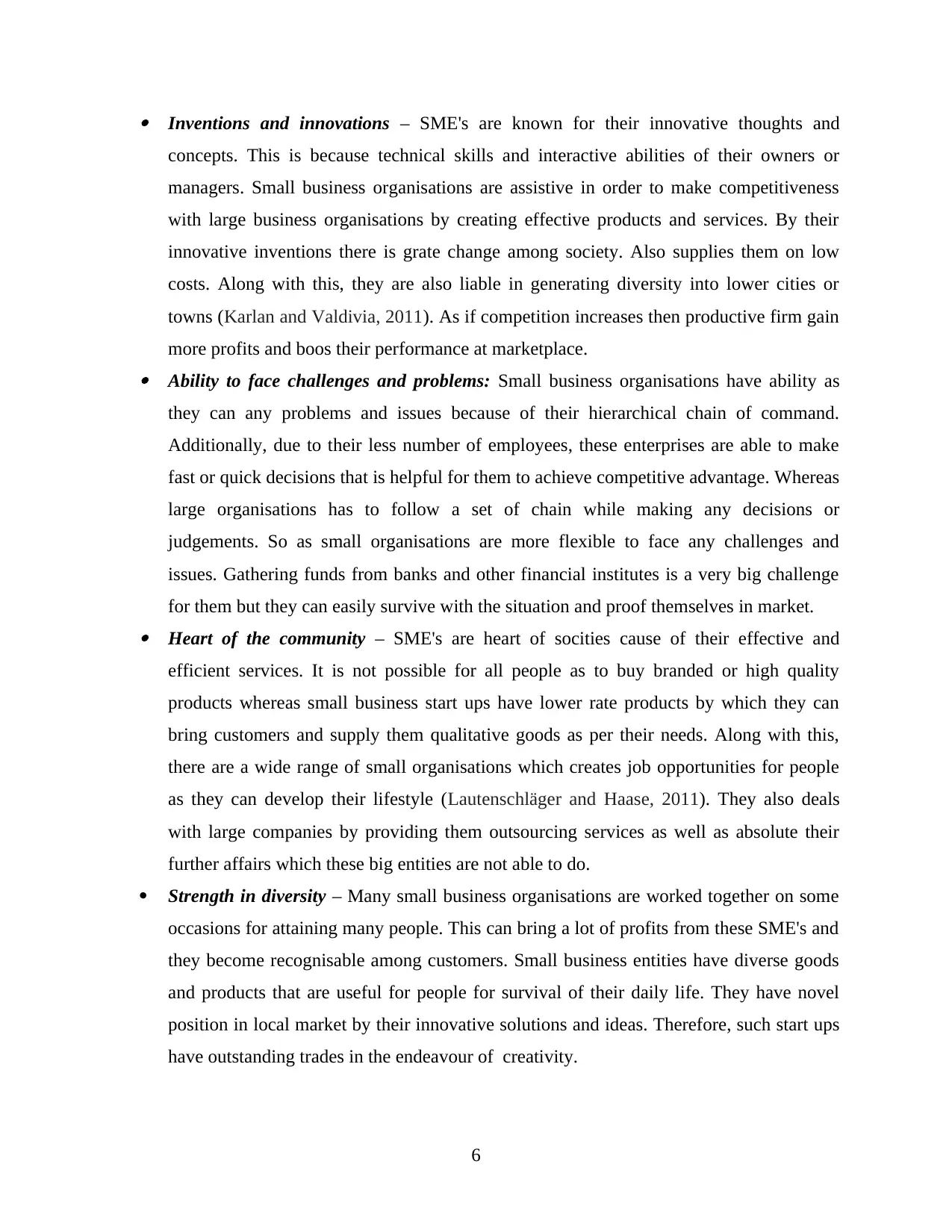
Inventions and innovations – SME's are known for their innovative thoughts and
concepts. This is because technical skills and interactive abilities of their owners or
managers. Small business organisations are assistive in order to make competitiveness
with large business organisations by creating effective products and services. By their
innovative inventions there is grate change among society. Also supplies them on low
costs. Along with this, they are also liable in generating diversity into lower cities or
towns (Karlan and Valdivia, 2011). As if competition increases then productive firm gain
more profits and boos their performance at marketplace. Ability to face challenges and problems: Small business organisations have ability as
they can any problems and issues because of their hierarchical chain of command.
Additionally, due to their less number of employees, these enterprises are able to make
fast or quick decisions that is helpful for them to achieve competitive advantage. Whereas
large organisations has to follow a set of chain while making any decisions or
judgements. So as small organisations are more flexible to face any challenges and
issues. Gathering funds from banks and other financial institutes is a very big challenge
for them but they can easily survive with the situation and proof themselves in market. Heart of the community – SME's are heart of socities cause of their effective and
efficient services. It is not possible for all people as to buy branded or high quality
products whereas small business start ups have lower rate products by which they can
bring customers and supply them qualitative goods as per their needs. Along with this,
there are a wide range of small organisations which creates job opportunities for people
as they can develop their lifestyle (Lautenschläger and Haase, 2011). They also deals
with large companies by providing them outsourcing services as well as absolute their
further affairs which these big entities are not able to do.
Strength in diversity – Many small business organisations are worked together on some
occasions for attaining many people. This can bring a lot of profits from these SME's and
they become recognisable among customers. Small business entities have diverse goods
and products that are useful for people for survival of their daily life. They have novel
position in local market by their innovative solutions and ideas. Therefore, such start ups
have outstanding trades in the endeavour of creativity.
6
concepts. This is because technical skills and interactive abilities of their owners or
managers. Small business organisations are assistive in order to make competitiveness
with large business organisations by creating effective products and services. By their
innovative inventions there is grate change among society. Also supplies them on low
costs. Along with this, they are also liable in generating diversity into lower cities or
towns (Karlan and Valdivia, 2011). As if competition increases then productive firm gain
more profits and boos their performance at marketplace. Ability to face challenges and problems: Small business organisations have ability as
they can any problems and issues because of their hierarchical chain of command.
Additionally, due to their less number of employees, these enterprises are able to make
fast or quick decisions that is helpful for them to achieve competitive advantage. Whereas
large organisations has to follow a set of chain while making any decisions or
judgements. So as small organisations are more flexible to face any challenges and
issues. Gathering funds from banks and other financial institutes is a very big challenge
for them but they can easily survive with the situation and proof themselves in market. Heart of the community – SME's are heart of socities cause of their effective and
efficient services. It is not possible for all people as to buy branded or high quality
products whereas small business start ups have lower rate products by which they can
bring customers and supply them qualitative goods as per their needs. Along with this,
there are a wide range of small organisations which creates job opportunities for people
as they can develop their lifestyle (Lautenschläger and Haase, 2011). They also deals
with large companies by providing them outsourcing services as well as absolute their
further affairs which these big entities are not able to do.
Strength in diversity – Many small business organisations are worked together on some
occasions for attaining many people. This can bring a lot of profits from these SME's and
they become recognisable among customers. Small business entities have diverse goods
and products that are useful for people for survival of their daily life. They have novel
position in local market by their innovative solutions and ideas. Therefore, such start ups
have outstanding trades in the endeavour of creativity.
6
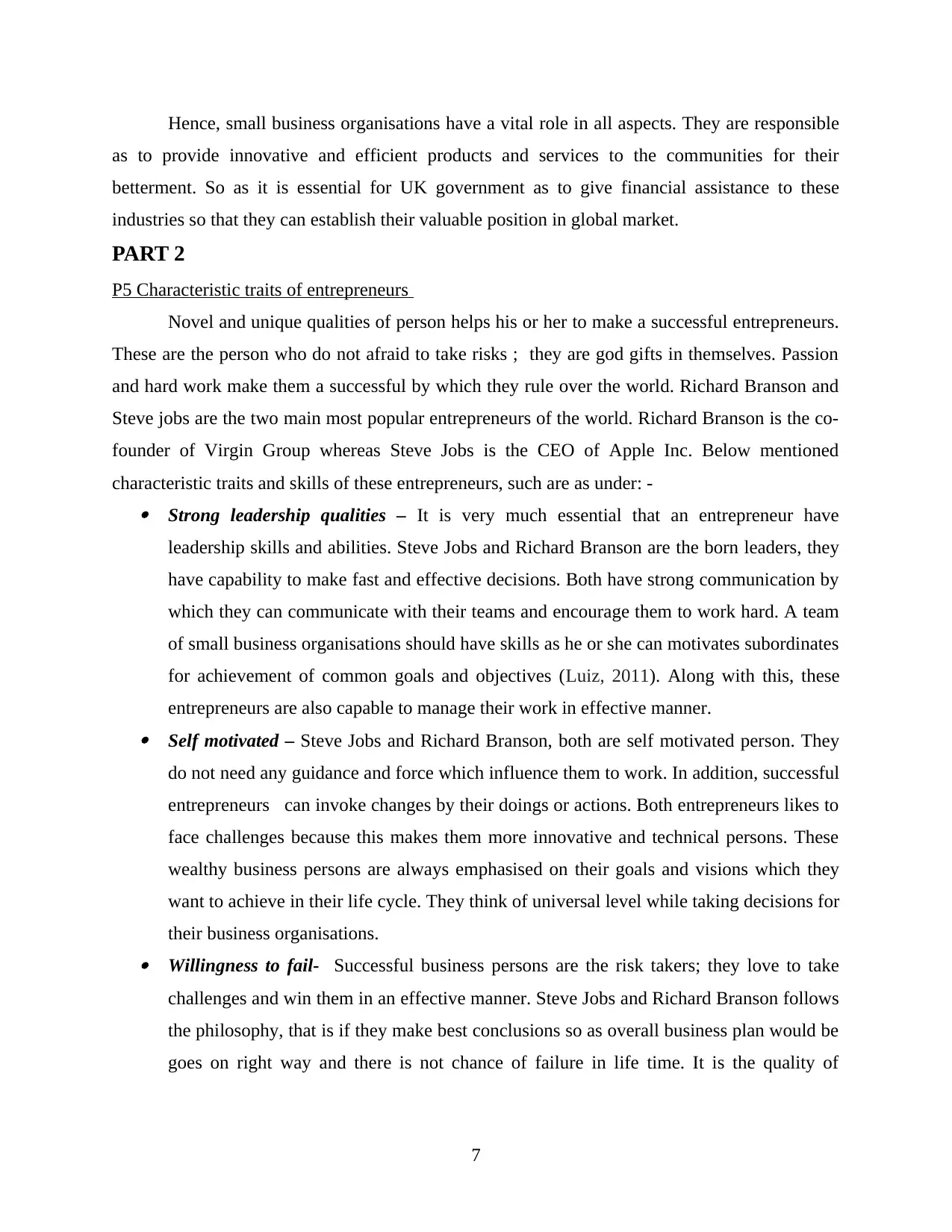
Hence, small business organisations have a vital role in all aspects. They are responsible
as to provide innovative and efficient products and services to the communities for their
betterment. So as it is essential for UK government as to give financial assistance to these
industries so that they can establish their valuable position in global market.
PART 2
P5 Characteristic traits of entrepreneurs
Novel and unique qualities of person helps his or her to make a successful entrepreneurs.
These are the person who do not afraid to take risks ; they are god gifts in themselves. Passion
and hard work make them a successful by which they rule over the world. Richard Branson and
Steve jobs are the two main most popular entrepreneurs of the world. Richard Branson is the co-
founder of Virgin Group whereas Steve Jobs is the CEO of Apple Inc. Below mentioned
characteristic traits and skills of these entrepreneurs, such are as under: - Strong leadership qualities – It is very much essential that an entrepreneur have
leadership skills and abilities. Steve Jobs and Richard Branson are the born leaders, they
have capability to make fast and effective decisions. Both have strong communication by
which they can communicate with their teams and encourage them to work hard. A team
of small business organisations should have skills as he or she can motivates subordinates
for achievement of common goals and objectives (Luiz, 2011). Along with this, these
entrepreneurs are also capable to manage their work in effective manner. Self motivated – Steve Jobs and Richard Branson, both are self motivated person. They
do not need any guidance and force which influence them to work. In addition, successful
entrepreneurs can invoke changes by their doings or actions. Both entrepreneurs likes to
face challenges because this makes them more innovative and technical persons. These
wealthy business persons are always emphasised on their goals and visions which they
want to achieve in their life cycle. They think of universal level while taking decisions for
their business organisations. Willingness to fail- Successful business persons are the risk takers; they love to take
challenges and win them in an effective manner. Steve Jobs and Richard Branson follows
the philosophy, that is if they make best conclusions so as overall business plan would be
goes on right way and there is not chance of failure in life time. It is the quality of
7
as to provide innovative and efficient products and services to the communities for their
betterment. So as it is essential for UK government as to give financial assistance to these
industries so that they can establish their valuable position in global market.
PART 2
P5 Characteristic traits of entrepreneurs
Novel and unique qualities of person helps his or her to make a successful entrepreneurs.
These are the person who do not afraid to take risks ; they are god gifts in themselves. Passion
and hard work make them a successful by which they rule over the world. Richard Branson and
Steve jobs are the two main most popular entrepreneurs of the world. Richard Branson is the co-
founder of Virgin Group whereas Steve Jobs is the CEO of Apple Inc. Below mentioned
characteristic traits and skills of these entrepreneurs, such are as under: - Strong leadership qualities – It is very much essential that an entrepreneur have
leadership skills and abilities. Steve Jobs and Richard Branson are the born leaders, they
have capability to make fast and effective decisions. Both have strong communication by
which they can communicate with their teams and encourage them to work hard. A team
of small business organisations should have skills as he or she can motivates subordinates
for achievement of common goals and objectives (Luiz, 2011). Along with this, these
entrepreneurs are also capable to manage their work in effective manner. Self motivated – Steve Jobs and Richard Branson, both are self motivated person. They
do not need any guidance and force which influence them to work. In addition, successful
entrepreneurs can invoke changes by their doings or actions. Both entrepreneurs likes to
face challenges because this makes them more innovative and technical persons. These
wealthy business persons are always emphasised on their goals and visions which they
want to achieve in their life cycle. They think of universal level while taking decisions for
their business organisations. Willingness to fail- Successful business persons are the risk takers; they love to take
challenges and win them in an effective manner. Steve Jobs and Richard Branson follows
the philosophy, that is if they make best conclusions so as overall business plan would be
goes on right way and there is not chance of failure in life time. It is the quality of
7
⊘ This is a preview!⊘
Do you want full access?
Subscribe today to unlock all pages.

Trusted by 1+ million students worldwide
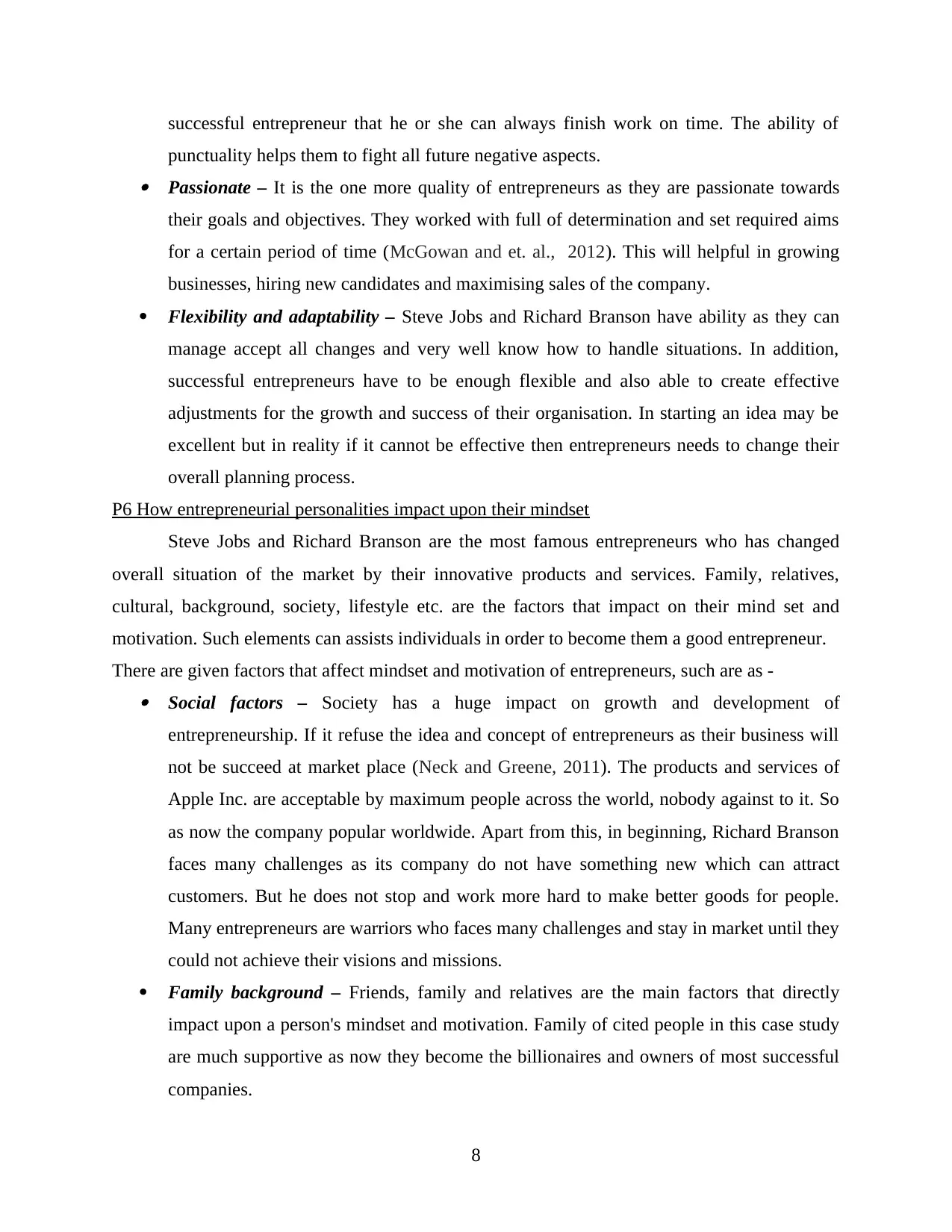
successful entrepreneur that he or she can always finish work on time. The ability of
punctuality helps them to fight all future negative aspects. Passionate – It is the one more quality of entrepreneurs as they are passionate towards
their goals and objectives. They worked with full of determination and set required aims
for a certain period of time (McGowan and et. al., 2012). This will helpful in growing
businesses, hiring new candidates and maximising sales of the company.
Flexibility and adaptability – Steve Jobs and Richard Branson have ability as they can
manage accept all changes and very well know how to handle situations. In addition,
successful entrepreneurs have to be enough flexible and also able to create effective
adjustments for the growth and success of their organisation. In starting an idea may be
excellent but in reality if it cannot be effective then entrepreneurs needs to change their
overall planning process.
P6 How entrepreneurial personalities impact upon their mindset
Steve Jobs and Richard Branson are the most famous entrepreneurs who has changed
overall situation of the market by their innovative products and services. Family, relatives,
cultural, background, society, lifestyle etc. are the factors that impact on their mind set and
motivation. Such elements can assists individuals in order to become them a good entrepreneur.
There are given factors that affect mindset and motivation of entrepreneurs, such are as - Social factors – Society has a huge impact on growth and development of
entrepreneurship. If it refuse the idea and concept of entrepreneurs as their business will
not be succeed at market place (Neck and Greene, 2011). The products and services of
Apple Inc. are acceptable by maximum people across the world, nobody against to it. So
as now the company popular worldwide. Apart from this, in beginning, Richard Branson
faces many challenges as its company do not have something new which can attract
customers. But he does not stop and work more hard to make better goods for people.
Many entrepreneurs are warriors who faces many challenges and stay in market until they
could not achieve their visions and missions.
Family background – Friends, family and relatives are the main factors that directly
impact upon a person's mindset and motivation. Family of cited people in this case study
are much supportive as now they become the billionaires and owners of most successful
companies.
8
punctuality helps them to fight all future negative aspects. Passionate – It is the one more quality of entrepreneurs as they are passionate towards
their goals and objectives. They worked with full of determination and set required aims
for a certain period of time (McGowan and et. al., 2012). This will helpful in growing
businesses, hiring new candidates and maximising sales of the company.
Flexibility and adaptability – Steve Jobs and Richard Branson have ability as they can
manage accept all changes and very well know how to handle situations. In addition,
successful entrepreneurs have to be enough flexible and also able to create effective
adjustments for the growth and success of their organisation. In starting an idea may be
excellent but in reality if it cannot be effective then entrepreneurs needs to change their
overall planning process.
P6 How entrepreneurial personalities impact upon their mindset
Steve Jobs and Richard Branson are the most famous entrepreneurs who has changed
overall situation of the market by their innovative products and services. Family, relatives,
cultural, background, society, lifestyle etc. are the factors that impact on their mind set and
motivation. Such elements can assists individuals in order to become them a good entrepreneur.
There are given factors that affect mindset and motivation of entrepreneurs, such are as - Social factors – Society has a huge impact on growth and development of
entrepreneurship. If it refuse the idea and concept of entrepreneurs as their business will
not be succeed at market place (Neck and Greene, 2011). The products and services of
Apple Inc. are acceptable by maximum people across the world, nobody against to it. So
as now the company popular worldwide. Apart from this, in beginning, Richard Branson
faces many challenges as its company do not have something new which can attract
customers. But he does not stop and work more hard to make better goods for people.
Many entrepreneurs are warriors who faces many challenges and stay in market until they
could not achieve their visions and missions.
Family background – Friends, family and relatives are the main factors that directly
impact upon a person's mindset and motivation. Family of cited people in this case study
are much supportive as now they become the billionaires and owners of most successful
companies.
8
Paraphrase This Document
Need a fresh take? Get an instant paraphrase of this document with our AI Paraphraser
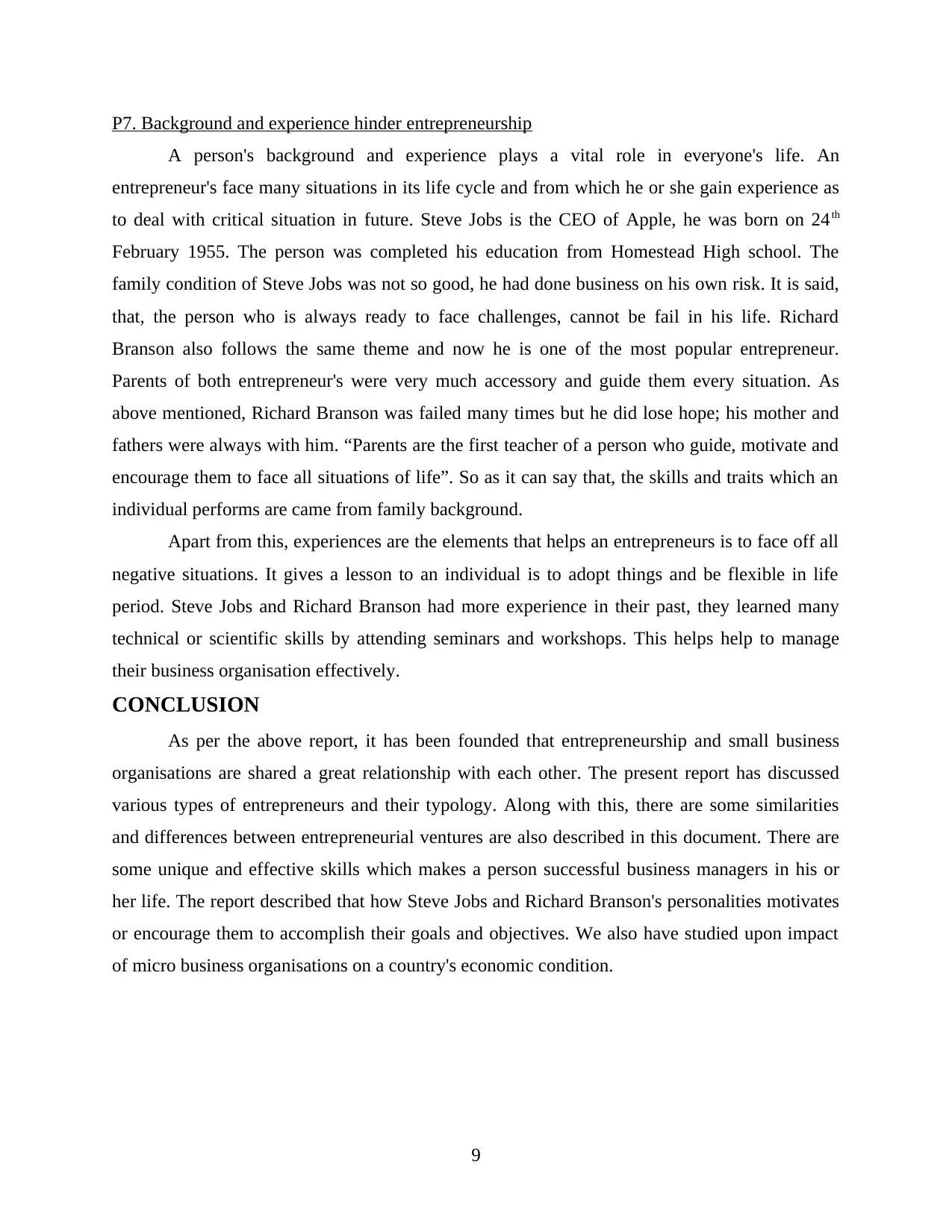
P7. Background and experience hinder entrepreneurship
A person's background and experience plays a vital role in everyone's life. An
entrepreneur's face many situations in its life cycle and from which he or she gain experience as
to deal with critical situation in future. Steve Jobs is the CEO of Apple, he was born on 24th
February 1955. The person was completed his education from Homestead High school. The
family condition of Steve Jobs was not so good, he had done business on his own risk. It is said,
that, the person who is always ready to face challenges, cannot be fail in his life. Richard
Branson also follows the same theme and now he is one of the most popular entrepreneur.
Parents of both entrepreneur's were very much accessory and guide them every situation. As
above mentioned, Richard Branson was failed many times but he did lose hope; his mother and
fathers were always with him. “Parents are the first teacher of a person who guide, motivate and
encourage them to face all situations of life”. So as it can say that, the skills and traits which an
individual performs are came from family background.
Apart from this, experiences are the elements that helps an entrepreneurs is to face off all
negative situations. It gives a lesson to an individual is to adopt things and be flexible in life
period. Steve Jobs and Richard Branson had more experience in their past, they learned many
technical or scientific skills by attending seminars and workshops. This helps help to manage
their business organisation effectively.
CONCLUSION
As per the above report, it has been founded that entrepreneurship and small business
organisations are shared a great relationship with each other. The present report has discussed
various types of entrepreneurs and their typology. Along with this, there are some similarities
and differences between entrepreneurial ventures are also described in this document. There are
some unique and effective skills which makes a person successful business managers in his or
her life. The report described that how Steve Jobs and Richard Branson's personalities motivates
or encourage them to accomplish their goals and objectives. We also have studied upon impact
of micro business organisations on a country's economic condition.
9
A person's background and experience plays a vital role in everyone's life. An
entrepreneur's face many situations in its life cycle and from which he or she gain experience as
to deal with critical situation in future. Steve Jobs is the CEO of Apple, he was born on 24th
February 1955. The person was completed his education from Homestead High school. The
family condition of Steve Jobs was not so good, he had done business on his own risk. It is said,
that, the person who is always ready to face challenges, cannot be fail in his life. Richard
Branson also follows the same theme and now he is one of the most popular entrepreneur.
Parents of both entrepreneur's were very much accessory and guide them every situation. As
above mentioned, Richard Branson was failed many times but he did lose hope; his mother and
fathers were always with him. “Parents are the first teacher of a person who guide, motivate and
encourage them to face all situations of life”. So as it can say that, the skills and traits which an
individual performs are came from family background.
Apart from this, experiences are the elements that helps an entrepreneurs is to face off all
negative situations. It gives a lesson to an individual is to adopt things and be flexible in life
period. Steve Jobs and Richard Branson had more experience in their past, they learned many
technical or scientific skills by attending seminars and workshops. This helps help to manage
their business organisation effectively.
CONCLUSION
As per the above report, it has been founded that entrepreneurship and small business
organisations are shared a great relationship with each other. The present report has discussed
various types of entrepreneurs and their typology. Along with this, there are some similarities
and differences between entrepreneurial ventures are also described in this document. There are
some unique and effective skills which makes a person successful business managers in his or
her life. The report described that how Steve Jobs and Richard Branson's personalities motivates
or encourage them to accomplish their goals and objectives. We also have studied upon impact
of micro business organisations on a country's economic condition.
9
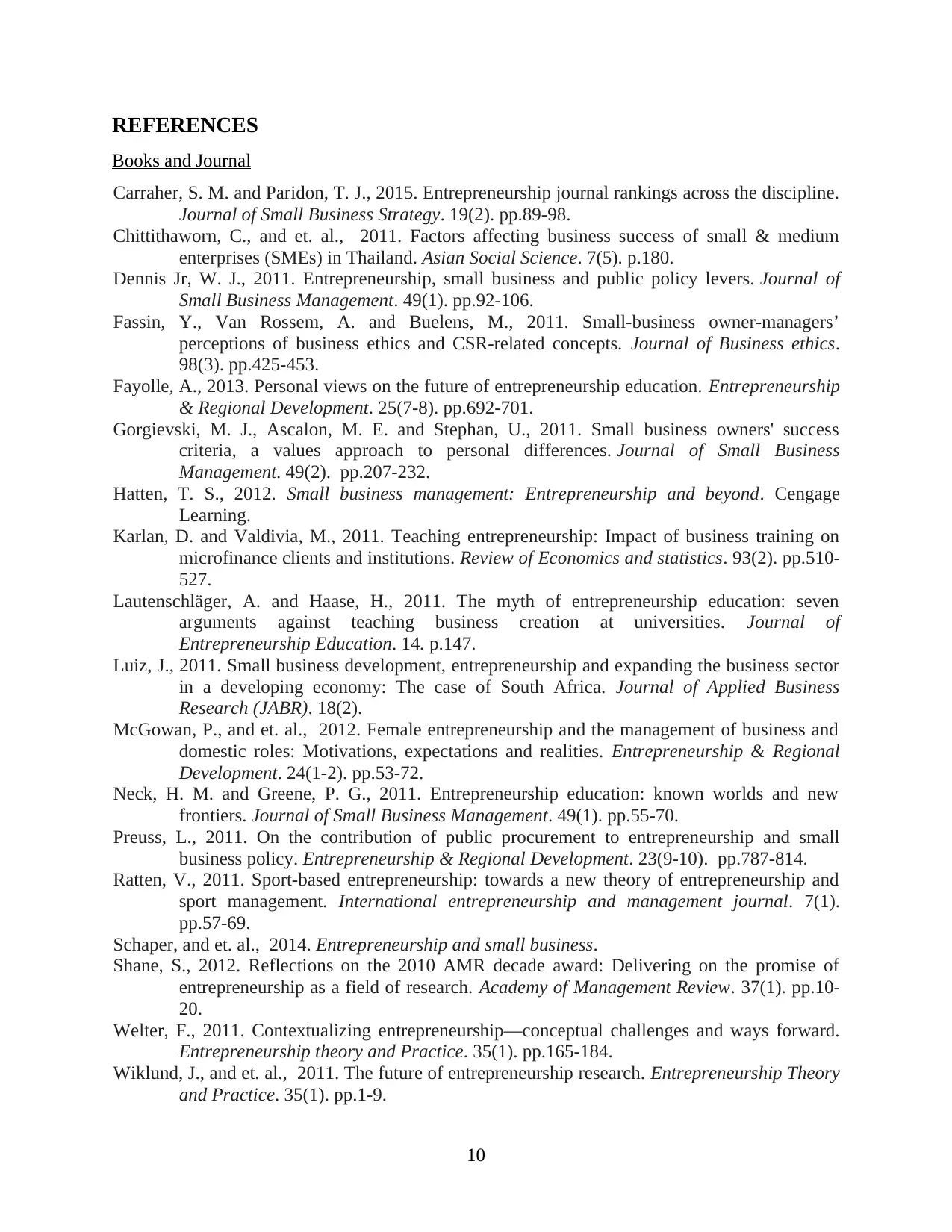
REFERENCES
Books and Journal
Carraher, S. M. and Paridon, T. J., 2015. Entrepreneurship journal rankings across the discipline.
Journal of Small Business Strategy. 19(2). pp.89-98.
Chittithaworn, C., and et. al., 2011. Factors affecting business success of small & medium
enterprises (SMEs) in Thailand. Asian Social Science. 7(5). p.180.
Dennis Jr, W. J., 2011. Entrepreneurship, small business and public policy levers. Journal of
Small Business Management. 49(1). pp.92-106.
Fassin, Y., Van Rossem, A. and Buelens, M., 2011. Small-business owner-managers’
perceptions of business ethics and CSR-related concepts. Journal of Business ethics.
98(3). pp.425-453.
Fayolle, A., 2013. Personal views on the future of entrepreneurship education. Entrepreneurship
& Regional Development. 25(7-8). pp.692-701.
Gorgievski, M. J., Ascalon, M. E. and Stephan, U., 2011. Small business owners' success
criteria, a values approach to personal differences. Journal of Small Business
Management. 49(2). pp.207-232.
Hatten, T. S., 2012. Small business management: Entrepreneurship and beyond. Cengage
Learning.
Karlan, D. and Valdivia, M., 2011. Teaching entrepreneurship: Impact of business training on
microfinance clients and institutions. Review of Economics and statistics. 93(2). pp.510-
527.
Lautenschläger, A. and Haase, H., 2011. The myth of entrepreneurship education: seven
arguments against teaching business creation at universities. Journal of
Entrepreneurship Education. 14. p.147.
Luiz, J., 2011. Small business development, entrepreneurship and expanding the business sector
in a developing economy: The case of South Africa. Journal of Applied Business
Research (JABR). 18(2).
McGowan, P., and et. al., 2012. Female entrepreneurship and the management of business and
domestic roles: Motivations, expectations and realities. Entrepreneurship & Regional
Development. 24(1-2). pp.53-72.
Neck, H. M. and Greene, P. G., 2011. Entrepreneurship education: known worlds and new
frontiers. Journal of Small Business Management. 49(1). pp.55-70.
Preuss, L., 2011. On the contribution of public procurement to entrepreneurship and small
business policy. Entrepreneurship & Regional Development. 23(9-10). pp.787-814.
Ratten, V., 2011. Sport-based entrepreneurship: towards a new theory of entrepreneurship and
sport management. International entrepreneurship and management journal. 7(1).
pp.57-69.
Schaper, and et. al., 2014. Entrepreneurship and small business.
Shane, S., 2012. Reflections on the 2010 AMR decade award: Delivering on the promise of
entrepreneurship as a field of research. Academy of Management Review. 37(1). pp.10-
20.
Welter, F., 2011. Contextualizing entrepreneurship—conceptual challenges and ways forward.
Entrepreneurship theory and Practice. 35(1). pp.165-184.
Wiklund, J., and et. al., 2011. The future of entrepreneurship research. Entrepreneurship Theory
and Practice. 35(1). pp.1-9.
10
Books and Journal
Carraher, S. M. and Paridon, T. J., 2015. Entrepreneurship journal rankings across the discipline.
Journal of Small Business Strategy. 19(2). pp.89-98.
Chittithaworn, C., and et. al., 2011. Factors affecting business success of small & medium
enterprises (SMEs) in Thailand. Asian Social Science. 7(5). p.180.
Dennis Jr, W. J., 2011. Entrepreneurship, small business and public policy levers. Journal of
Small Business Management. 49(1). pp.92-106.
Fassin, Y., Van Rossem, A. and Buelens, M., 2011. Small-business owner-managers’
perceptions of business ethics and CSR-related concepts. Journal of Business ethics.
98(3). pp.425-453.
Fayolle, A., 2013. Personal views on the future of entrepreneurship education. Entrepreneurship
& Regional Development. 25(7-8). pp.692-701.
Gorgievski, M. J., Ascalon, M. E. and Stephan, U., 2011. Small business owners' success
criteria, a values approach to personal differences. Journal of Small Business
Management. 49(2). pp.207-232.
Hatten, T. S., 2012. Small business management: Entrepreneurship and beyond. Cengage
Learning.
Karlan, D. and Valdivia, M., 2011. Teaching entrepreneurship: Impact of business training on
microfinance clients and institutions. Review of Economics and statistics. 93(2). pp.510-
527.
Lautenschläger, A. and Haase, H., 2011. The myth of entrepreneurship education: seven
arguments against teaching business creation at universities. Journal of
Entrepreneurship Education. 14. p.147.
Luiz, J., 2011. Small business development, entrepreneurship and expanding the business sector
in a developing economy: The case of South Africa. Journal of Applied Business
Research (JABR). 18(2).
McGowan, P., and et. al., 2012. Female entrepreneurship and the management of business and
domestic roles: Motivations, expectations and realities. Entrepreneurship & Regional
Development. 24(1-2). pp.53-72.
Neck, H. M. and Greene, P. G., 2011. Entrepreneurship education: known worlds and new
frontiers. Journal of Small Business Management. 49(1). pp.55-70.
Preuss, L., 2011. On the contribution of public procurement to entrepreneurship and small
business policy. Entrepreneurship & Regional Development. 23(9-10). pp.787-814.
Ratten, V., 2011. Sport-based entrepreneurship: towards a new theory of entrepreneurship and
sport management. International entrepreneurship and management journal. 7(1).
pp.57-69.
Schaper, and et. al., 2014. Entrepreneurship and small business.
Shane, S., 2012. Reflections on the 2010 AMR decade award: Delivering on the promise of
entrepreneurship as a field of research. Academy of Management Review. 37(1). pp.10-
20.
Welter, F., 2011. Contextualizing entrepreneurship—conceptual challenges and ways forward.
Entrepreneurship theory and Practice. 35(1). pp.165-184.
Wiklund, J., and et. al., 2011. The future of entrepreneurship research. Entrepreneurship Theory
and Practice. 35(1). pp.1-9.
10
⊘ This is a preview!⊘
Do you want full access?
Subscribe today to unlock all pages.

Trusted by 1+ million students worldwide
1 out of 13
Related Documents
Your All-in-One AI-Powered Toolkit for Academic Success.
+13062052269
info@desklib.com
Available 24*7 on WhatsApp / Email
![[object Object]](/_next/static/media/star-bottom.7253800d.svg)
Unlock your academic potential
Copyright © 2020–2026 A2Z Services. All Rights Reserved. Developed and managed by ZUCOL.




